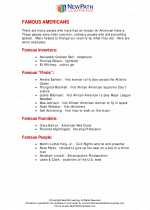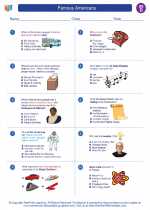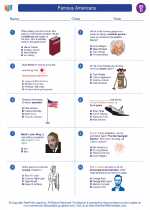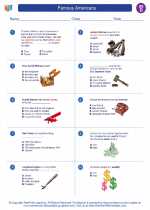Siblings
Siblings are individuals who have at least one parent in common. They are connected through their family and share a unique bond that can have a significant impact on their lives.
Types of Sibling Relationships
There are various types of sibling relationships, including:
- Biological Siblings: Siblings who share both biological parents.
- Half-Siblings: Siblings who share one biological parent.
- Step-Siblings: Siblings who are not biologically related but are brought together through the marriage of one of their parents.
- Adopted Siblings: Siblings who are not biologically related but are part of the same family through adoption.
Impact of Sibling Relationships
The relationship between siblings can have a significant impact on their social, emotional, and cognitive development. Siblings can influence each other's behavior, attitudes, and beliefs, and can provide emotional support and companionship.
Study Guide
Questions
- What are the different types of sibling relationships?
- How can sibling relationships impact individuals?
Discussion Points
- Discuss the role of siblings in shaping each other's personalities and interests.
- Explore the challenges and benefits of having siblings of different ages.
Activities
- Interview a family member or friend about their experiences with siblings and present your findings to the class.
- Write a short story or create a piece of artwork that illustrates the bond between siblings.
◂Social Studies Worksheets and Study Guides Fourth Grade. Famous Americans
Study Guide Famous Americans
Famous Americans  Worksheet/Answer key
Worksheet/Answer key Famous Americans
Famous Americans  Worksheet/Answer key
Worksheet/Answer key Famous Americans
Famous Americans  Worksheet/Answer key
Worksheet/Answer key Famous Americans
Famous Americans 

 Worksheet/Answer key
Worksheet/Answer key
 Worksheet/Answer key
Worksheet/Answer key
 Worksheet/Answer key
Worksheet/Answer key

The resources above cover the following skills:
National Curriculum Standards for Social Studies (NCSS)
TIME, CONTINUITY, AND CHANGE
SOCIAL STUDIES PROGRAMS SHOULD INCLUDE EXPERIENCES THAT PROVIDE FOR THE STUDY OF THE PAST AND ITS LEGACY.
KNOWLEDGE - Learners will understand:
Key people, events, and places associated with the history of the community, nation, and world.
National Standards for Civics and Government (NSCG)
What are the Basic Values and Principles of American Democracy? Why is it important for Americans to share certain values, principles, and beliefs?
American identity: Students should be able to explain the importance of Americans sharing and supporting certain values, principles, and beliefs. To achieve this standard, students should be able to
Describe holidays Americans celebrate and explain how they reflect their shared values, principles, and beliefs, e.g., the Fourth of July, Labor Day, Memorial Day, Presidents’ Day, Columbus Day, Thanksgiving, Veterans Day, Martin Luther King, Jr.’s Birthday
National Center for History in Schools (NCHS)
Historical Thinking Standards
Historical Analysis and Interpretation
Compare different stories about a historical figure, era, or event.
Topic 3: The History of the United States: Democratic Principles and Values and the People from Many Cultures Who Contributed to Its Cultural, Economic, and Political Heritage
How democratic values came to be, and how they have been exemplified by people, events, and symbols.
The student understands historic figures who have exemplified values and principles of American democracy.
Topic 4: The History of Peoples of Many Cultures Around the World
Major discoveries in science and technology, their social and economic effects, and the scientists and inventors responsible for them.
The student understands the development of technological innovations, the major scientists and inventors associated with them and their social and economic effects.